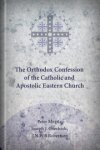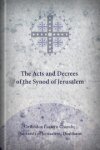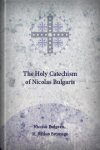Confessions and Catechisms of the Orthodox Church (3 vols.)
Digital Logos Edition
Overview
This collection includes three catechisms and confessions of faith from the perspective of the Orthodox Christian Church in the seventeenth century. These works are invaluable for their insights into Orthodox theology and piety during the Ottoman occupation, as well as their interactions with both the Roman Catholic and Protestant theology of that era–they’re essential for students of Church history.
With the enhanced Logos edition of these texts, you can search across all three works for the Orthodox perspective on particular doctrines, specific Scripture references, and references to the Church Fathers. Integrated with your Logos library, so you can even compare the viewpoints of the Orthodox Church with those of other Protestant and Roman Catholic catechisms and confessions of faith. A must-have for every theological scholar’s library.

Key Features
- Original English translations of each confession and catechism
- Prefaces and introductions to the English editions
- Letters of approval from Orthodox Bishops and professors at the time of translation
Product Details
- Title: Confessions and Catechisms of the Orthodox Church (3 vols.)
- Authors: Peter Mogila, Metropolitan of Kiev, Dositheus, Patriarch of Jerusalem, and Nicolas Bulgaris
- Editors: Julius Joseph Overbeck, J.N.W.B. Robertson, and R. Raikes Bromage
- Translators: Philip Lodvel, J.N.W.B. Robertson, and W.E. Daniel
- Publishers: Thomas Baker and J. Masters and Co.
- Volumes: 3
- Pages: 779
Individual Titles
- The Orthodox Confession of the Catholic and Apostolic Eastern Church by Peter Mogila
- The Acts and Decrees of the Synod of Jerusalem by Dositheus, Patriarch of Jerusalem
- The Holy Catechism of Nicolas Bulgaris by Nicolas Bulgaris

The Orthodox confession of Peter Mogila was written in 1645 as a defense of the Orthodox Christian faith against the influence of both Jesuits and Protestants in Polish-dominated parts of Old Rus. His most well-known and celebrated writing, it serves as one of the most important Orthodox theological works of the seventeenth century. In 1642, the catechism was approved by the Council of Jassy in Romania, and the patriarchs of Constantinople, Alexandria, Jerusalem, and Antioch approved it two years later. The 1672 Synod of Jerusalem, convened by Dositheus II, adopted his catechism as the standard catechism for the Orthodox Church.
Peter Mogila was the metropolitan of Kiev and Galicia from 1632 to 1646. He made extensive contributions to the improvement of clerical education for Orthodox Christians in the seventeenth century in Kiev, founding the Kiev-Mogila Academy, where classes were given primarily in Latin, but also in Russian and Greek. He was the leader of the Orthodox Church of Old Rus during Polish rule, and helped preserve the Orthodox Church in that country following the defection of a sizable number of Orthodox churches to Rome in 1596.

The Acts and Decrees of the Synod of Jerusalem
- Author: Dositheus, Patriarch of Jerusalem
- Translator: J.N.W.B. Robertson
- Publisher: Thomas Baker
- Publication Date: 1899
- Pages: 249
First published in 1672 by Patriarch Dositheus II of Jerusalem as a summation of the decisions of that year’s Synod of Jerusalem, this confession of faith provides not only a summary of Orthodox Christian doctrine in the seventeenth century, but also a unique interaction between Orthodox theology and the Calvinists of the Protestant Reformation, as well as the Roman Catholic church of that same period. The synod and this response were inspired by Calvinist writings, such as the Confession of Faith of 1629, that were being falsely attributed to Cyril I Lucaris (1572-1638), Patriarch of Constantinople.
Dositheus II Notarius was the eminent orthodox patriarch of Jerusalem from 1669 to 1707. A renowned theologian and pastor, Dositheus took a firm stance against the widespread influences of both Protestantism and Roman Catholicism during his ministry, seeking to preserve the traditions and beliefs of the Orthodox Church during the tumultuous Ottoman rule. Dositheus was born in Arachova, Greece in 1641, ordained as a deacon in 1652, and finally made archbishop of Caesarea Palestinae in 1666, before being elevated to the Patriarchal seat of Jerusalem in 1669. He was the primary author of the Acts and Decrees of the Synod of Jerusalem, a monumental apology of the Orthodox faith, and his 12-volume History of the Patriarchate of Jerusalem was published post-humously in 1715.

The Holy Catechism of Nicolas Bulgaris
- Author: Nicolas Bulgaris
- Editor: R. Raikes Bromage
- Translator: W.E. Daniel
- Publisher: J. Masters and Co.
- Publication Date: 1893
- Pages: 336
Also known by the titles A Holy Catechism and Explanation of the Divine and Holy Liturgy, and Examination of Candidates for Ordination, this catechism was written by the celebrated Nicolas Bulgaris at the Patriarchal Press of Constantinople in 1634. It serves as not only an important encapsulation of Orthodox doctrine and piety of that period, but also a helpful guide on the continuity between the rites and services of that time and those of the Orthodox Church today.
Nicolas Bulgaris lived at the beginning of the seventeenth century. His native land was Corcyra, among the Ionian islands of Greece, and he was raised by a faithful Christian family. After an extensive education, which led to his being named Doctor of Philosophy and Medicine, he turned his efforts to the study of the Church Fathers and the Sacred Scriptures. His other work included hymnography, writing an Italian account of the translation of the relics of St. Spyridon from Constantinople, and substantial contributions to the preservation of the theology and piety of the Orthodox Church.
About the Translators
Julius Joseph Overbeck (1820–1905) was a Roman Catholic priest who later converted to Eastern Orthodoxy, helping pioneer the modern emergence of a Western-Rite Orthodox tradition. He was author of Catholic Orthodoxy and Anglo-Catholicism, as well as editor/publisher of The Orthodox Catholic Review, a journal on Orthodox Christianity from the Western-Rite perspective.
J.N.W.B. Robertson, a scholar of the Church of England, published an English translation of the Orthodox Divine Liturgies.
R. Raikes Bromage (1853–1922), born and educated in England, served as both a deacon and a priest in the Church of England, and eventually converted to Roman Catholicism in 1895. He also served as secretary and treasurer for the Catholic Education Board.
Reviews
6 ratings
AeliusCicero
6/19/2014

Johnnie Ray Bailey
1/4/2014

G
1/2/2014
V. Rev. K. Michael Anderson
12/13/2013

Doug
11/22/2013

Dave Crosby
10/19/2013